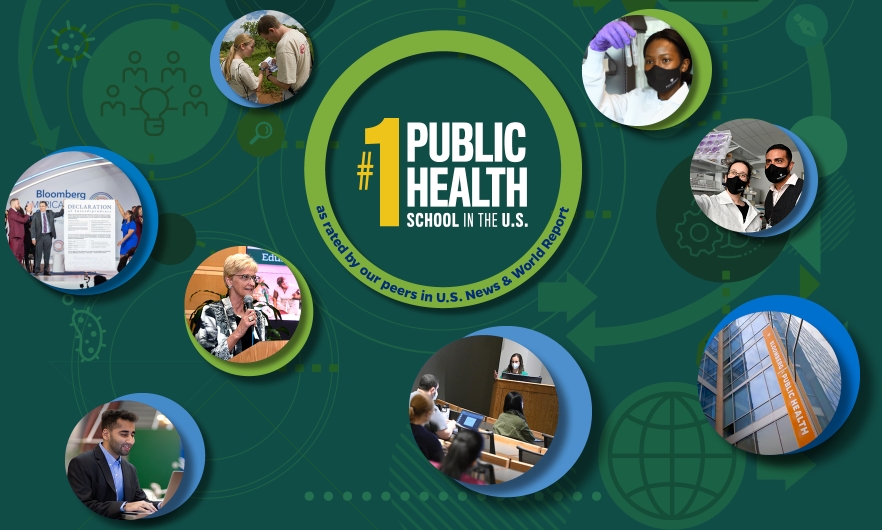Johns Hopkins Bloomberg School of Public Health Again Ranked #1 by Peers in U.S. News & World Report

The Johns Hopkins Bloomberg School of Public Health has again been named the top public health school in the nation by its peer schools and programs, as measured by U.S. News & World Report. The Bloomberg School has held the #1 spot since the rankings began in 1994.
This year’s U.S. News & World Report rankings include 206 public health schools and programs accredited by the Council on Education for Public Health. The U.S. News rankings survey, which is sent to leaders of the accredited schools and programs, is based on a single question about the academic quality of each public health school or program. The previous rankings were published in 2022.
“We are always deeply proud to be recognized by our peers as a leader in public health,” said Dean Ellen J. MacKenzie, PhD, ScM. “We continue to deliver on our mission of protecting health and saving lives worldwide and have made tremendous progress this past year in areas such as preventing gun violence, advancing Indigenous health, and addressing the ongoing COVID-19 pandemic. It is an honor to be recognized by our peers for this work, and it inspires us to continue to do more.”
This year’s rankings include specialty areas within public health. In these rankings, which are based on peer nominations, the Bloomberg School has been named by peers as leading the fields of:
- #1 Biostatistics
- #1 Environmental Health Sciences
- #1 Epidemiology
- #1 Health Policy and Management
- #2 Social and Behavioral Sciences
The nation’s oldest and largest school of public health, the Bloomberg School was established at Johns Hopkins University more than a century ago. It currently has 3,600+ students and 1,700+ faculty members. With more than $500 million in annual research funding, 27,000+ alumni, and work in 60+ countries, the School has unique impact and reach.
A recent evaluation of efforts related to the School’s five-year strategic plan, launched in 2018, found significant progress across its five core themes of education, science, partnerships, people, and advocacy.
Here are a few highlights from the past year:
- The Bloomberg American Health Initiative continues to lead the way in addressing the country’s most pressing health challenges, with 269 Bloomberg Fellows representing 235 collaborating organizations that include law enforcement agencies, libraries, community-based organizations, and local health departments.
- The newly renamed Center for Indigenous Health is expanding its mission to work to support and study Indigenous communities worldwide. The Center was recently named a winner of the LEGO Foundation’s Build a World of Play Challenge, receiving $27.8 million to expand their Family Spirit home-visiting program and develop Indigenous-designed, intergenerational outdoor play spaces.
- The Center for Gun Violence Solutions has continued to lead advocacy efforts to pass extreme risk protection orders, a proven method of reducing injuries and deaths that is now law in 19 states and the District of Columbia, and to study and promote other gun safety measures to help keep communities safe.
- The Bloomberg School helped launch the JHU-USCF Opioid Industry Documents Archive, a digital repository of more than 1.4 million litigation documents from companies whose work was found to have contributed to the opioid epidemic. The School also played a critical role in the development and implementation of a set of guiding principles to help states effectively spend their litigation funds to prevent further tragedies and save lives.
- Bloomberg School immunology researchers and colleagues from the School of Medicine who spearheaded a large clinical trial to study the efficacy of convalescent plasma as a therapy for COVID-19 were recognized with a 2023 Top 10 Clinical Research Achievement Award from the Clinical Research Forum.
- The Bloomberg School ran more than 30 COVID-19 prevention campaigns on social media, which reached more than 160 million U.S. adults.
“Today’s public health challenges—from health inequities rooted in long-standing societal racism to humanitarian crises and the always evolving threat of infectious disease—are daunting,” said Dean MacKenzie. “I’m grateful, as always, to our faculty, staff, students, alumni, and supporters for their commitment to excellence and to addressing the challenges ahead. Together, we will continue to build a healthier, safer, more equitable world.”
###
For more information, contact: Robin Scullin rsculli1@jhu.edu and Kristine Henry khenry39@jhu.edu
